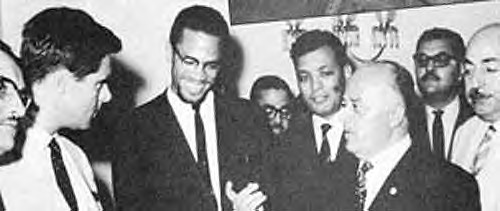
Malcolm X with early leaders of the Palestine Liberation Organization (PLO) in 1964. Malcolm was a staunch critic of zionism as a political philosophy., a photo by Pan-African News Wire File Photos on Flickr.
Jeff Gerritt: Malcolm X returns in an inspiring exhibit
February 23, 2012
Michigan and Detroit have little to remind them of their ties to arguably the greatest American leader of the 20th Century. Malcolm X -- born Malcolm Little in Omaha, Neb. -- spent much of his youth in the Lansing area, where his family moved when Malcolm was 4, and later in Detroit, the birthplace of the Nation of Islam and home to one of the first temples Malcolm attended. Still, about the only concrete reminder of his Michigan roots is an obscure home site marker in Lansing.
The man once known as Detroit Red continues to live in the hearts of many, however, especially in Detroit, a predominately African-American city that practically defines the nation's urban crisis. Malcolm X's courage and uncompromising convictions -- he sought freedom by any means necessary -- guided him from street hustler and prisoner to international voice for the oppressed.
Given Malcolm X's Detroit ties, it's not surprising that Detroit attorney and writer Gregory J. Reed, who is leading a national resurrection and re-evaluation of Malcolm X, chose this city for the first public viewing of the lost chapters of Malcolm X. He bought the unpublished manuscripts -- omitted from Malcolm X's 1965 autobiography -- at an auction in 1992.
The exhibit also will display, among other things, Nation of Islam documents; Rosa Parks' arrest record and fingerprints; slave estate papers; photographs of Malcolm X, Parks, Martin Luther King Jr. and Marcus Garvey; unpublished poetry; handwritten notations; and a letter Malcolm X wrote from Mecca, Saudi Arabia.
"Malcolm's foundation took place in Detroit; this is a way of giving him homage," Reed told me Tuesday. "Disclosing these papers here -- it's almost like completing a circle."
The "Discovery of the Malcolm X Lost Chapters" preview exhibit starts today, during a presentation by Reed from 10 a.m.-noon at the Wayne County Community College District's downtown campus. The showing continues 9 a.m.-6 p.m. Friday. All events are free. Other tour stops will include Augusta, Ga.; Jackson, Miss.; Boston, and the New York Historical Society Museum.
The five lost chapters, including a plan for African-American independence, were dropped from Alex Haley's "Autobiography of Malcolm X," Reed argues, because they showed a broader view of humanity and freedom that was out of sync with the separatist tone of the rest of the work.
Malcolm X signed an agreement, on March 21, 1964, just before a trip to the Middle East and pilgrimage to Mecca, authorizing publication of the original manuscript, including the unpublished chapters. Haley also wanted the lost chapters released, Reed said, and he considered them the autobiography's most important material. "Those essays gave greater insight into Malcolm's vision and thought for America," said Reed, who also represented civil rights icon Parks.
Before he was assassinated in New York City on Feb. 21, 1965, at the age of 39, Malcolm X helped carry the struggle of African Americans into the global arena, redefining the freedom movement as one of human, not just civil, rights.
Malcolm X's brilliant and open mind could take complex ideas and make them plain. After his pilgrimage to Mecca, he altered his views on white people and race relations, affirming that we are all part of the human family. While working with white groups, however, he remained a black nationalist, understanding that African Americans must control their institutions and economies to gain real equality in America.
Reed called his studies of Malcolm X a journey of self-discovery -- one he hopes his exhibit will inspire other Detroiters to take.
Last year, I joined Reed when he read excerpts from the lost chapters to more than 100 inmates at Detroit's Ryan Correctional Facility. Watching the men listen with rapt attention and talking to them afterward, I recalled one of Malcolm X's greatest legacies: his power to change how people think about themselves and others. Perhaps most of all, he wanted black people to love themselves as much as he loved them.
"My whole life has been a chronology of changes," he said. "I'm for truth, no matter who tells it. I'm for justice, no matter who it is for or against. I'm a human being first and foremost, and as such I'm for whoever and whatever benefits humanity as a whole."
In an era when politics has become increasingly crude, crass and cowardly, Malcolm X's moral weight shines like a beacon in the dark. By resurrecting his words, Reed has given Detroit, and his country, a gift -- an unflinching reminder of a leader whose extraordinary journey should challenge us all to do better.
JEFF GERRITT is a Free Press editorial writer. Contact him: 313-222-6585 or gerritt@freepress.com.
No comments:
Post a Comment